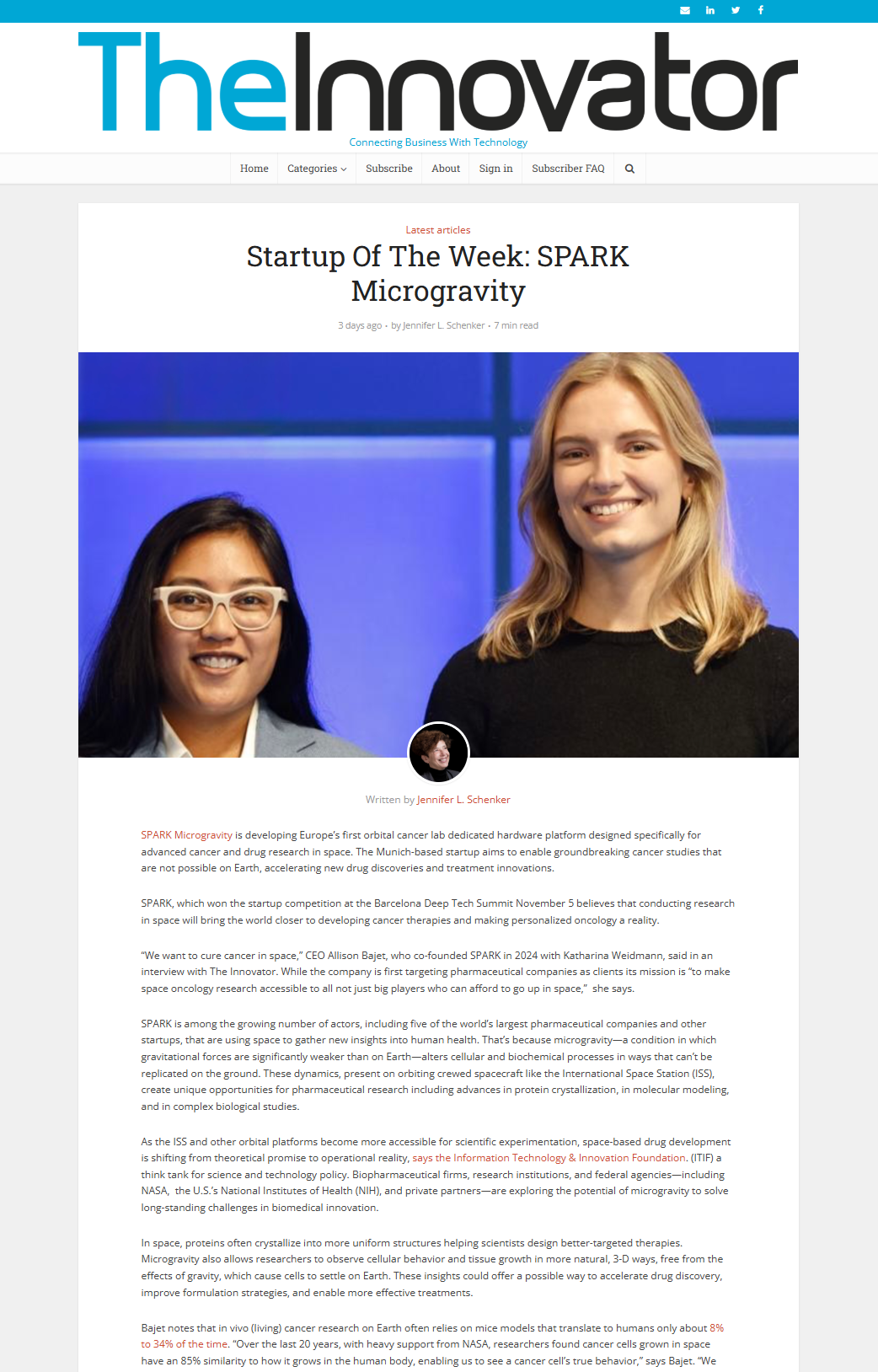
THE INNOVATOR: Startup Of The Week: SPARK Microgravity
Meet the startup who won #1 EU Deep Tech Award 2025

Allison Bajet and Katharina Weidmann, the founders of SPARK Microgravity, are building Europe's first orbital cancer lab to prove that the next generation of oncology breakthroughs will be discovered in space.
TL;DR: The Executive Overview
In a world where the lines between aerospace and biotechnology are blurring, two visionary founders are pioneering an audacious new approach to fighting cancer. Allison Bajet and Katharina Weidmann, the CEO and COO of SPARK Microgravity, are building Europe’s first orbital cancer lab. Allison's thesis was reseraching the microgravity research ecosystem environment of space and find more effective ways to bring oncology breakthroughs that have long eluded researchers on Earth.
For decades, the pharmaceutical industry has struggled with a "translation gap"—more than 90% of promising oncology drugs fail in human trials because traditional lab models like flat petri dishes and animal studies don't accurately predict human response. Bajet and Weidmann recognized that microgravity offers a solution. In the near-weightless conditions of orbit, cancer cells self-assemble into complex 3D structures that closely mimic how tumors actually grow in the body. This creates a superior, more predictive model for testing new therapies. Their message to pharma executives and investors is clear: space is no longer a novelty; it is a strategic R&D asset that is now open for business.
Seeing the immense potential of orbital research, Bajet and Weidmann asked a critical question: what if any scientist could leverage microgravity without needing to be a NASA insider? The answer is SPARK Microgravity, a startup founded to democratize access to space.
Their company provides a turnkey, end-to-end platform that handles the staggering complexity of spaceflight. A pharmaceutical company or academic lab can partner with SPARK to design an experiment, and SPARK manages the rest: custom hardware engineering, launch logistics, on-orbit automation, and an AI-powered analytics pipeline to process the results. This "microgravity-as-a-service" model strips away the operational burdens, allowing R&D teams to focus entirely on the science. By making orbital research as accessible as any other specialized contract research service, they are breaking down the financial and logistical barriers that once made space an exclusive domain.
The scientific case for orbital research is compelling. Removing gravity from the equation fundamentally alters cancer biology in three key ways:
These advantages have profound implications for drug development. From identifying more effective drug targets to creating novel, patient-friendly drug formulations, the insights gained from orbit can accelerate and de-risk the entire R&D pipeline.
The concept of space biotech is rapidly moving from theory to practice. Major pharmaceutical companies like Merck and Bristol Myers Squibb have already conducted successful experiments on the International Space Station, using microgravity to improve drug formulations and crystallization. Venture capital is taking notice, with startups in the sector securing significant funding rounds.
SPARK Microgravity is poised to become a leader in this emerging field. The company is developing its proprietary automated lab hardware and a cloud-based platform for experiment management. Their first in-orbit demonstration mission, a proof-of-concept orbital cancer lab, is planned for early 2026. This mission aims to validate their platform by sending cancer organoids to space, monitoring their response to treatment, and delivering actionable data back to Earth. A successful flight will mark a major milestone for Europe’s commercial space and biotech sectors.
For pharmaceutical executives and investors, the business case for microgravity research is built on clear ROI levers. A relatively modest investment in an orbital experiment can de-risk a billion-dollar drug development program by providing more predictive data early on. It can lead to new, defensible intellectual property through the discovery of novel drug targets or superior formulations.
Furthermore, a new formulation—such as turning an IV-only biologic into a simple subcutaneous injection—can extend a drug's patent life and secure a massive competitive advantage, potentially adding billions in revenue. As the costs of space access continue to fall, the risk-reward calculation is shifting decisively in favor of exploration.
The SPARK Microgravity story is not just one of scientific innovation; it is also a trailblazing example of female leadership in the historically male-dominated aerospace industry. With a background in aerospace innovation, CEO Allison Bajet drives the company’s vision of making space accessible to all. As COO and Chief Legal Officer, Katharina Weidmann brings deep expertise in navigating the complex regulatory landscape of international space law.
Their complementary skills and relentless determination are a powerful combination. In an industry where women remain significantly underrepresented, Bajet and Weidmann are not only building a cutting-edge company but also serving as powerful role models. Their leadership demonstrates the immense value that diverse perspectives bring to solving humanity’s biggest challenges, whether on Earth or in orbit.
As SPARK Microgravity prepares for its inaugural mission, the company is actively seeking partners in the pharmaceutical and biotech industries. They are building a future where orbital research is a standard, indispensable tool in the fight against cancer. For forward-thinking leaders, this is an opportunity to get in on the ground floor of the next great wave of medical innovation.
The journey from a lab bench on Earth to an automated laboratory in orbit is no longer science fiction. Thanks to the vision and drive of founders like Allison Bajet and Katharina Weidmann, it is the new reality of oncology R&D.
SPARK Microgravity is a startup dedicated to democratizing space research and making it accessible for researchers across the globe. Headquartered in Munich with operations in the U.S. and Europe, SPARK Microgravity is building Europe’s first orbital cancer research laboratory to accelerate oncology breakthroughs. By providing end-to-end microgravity research services—from experiment design and launch integration to data analysis—SPARK Microgravity enables pharmaceutical companies, biotech startups, and academic teams to leverage the space environment for R&D. Our mission is to advance scientific exploration in low Earth orbit and translate those discoveries into life-saving innovations back on Earth.

Meet the startup who won #1 EU Deep Tech Award 2025

SPARK Microgravity's co-founders share their space research mission during an interview at Barcelona Deep Tech Week 2025.
.svg)